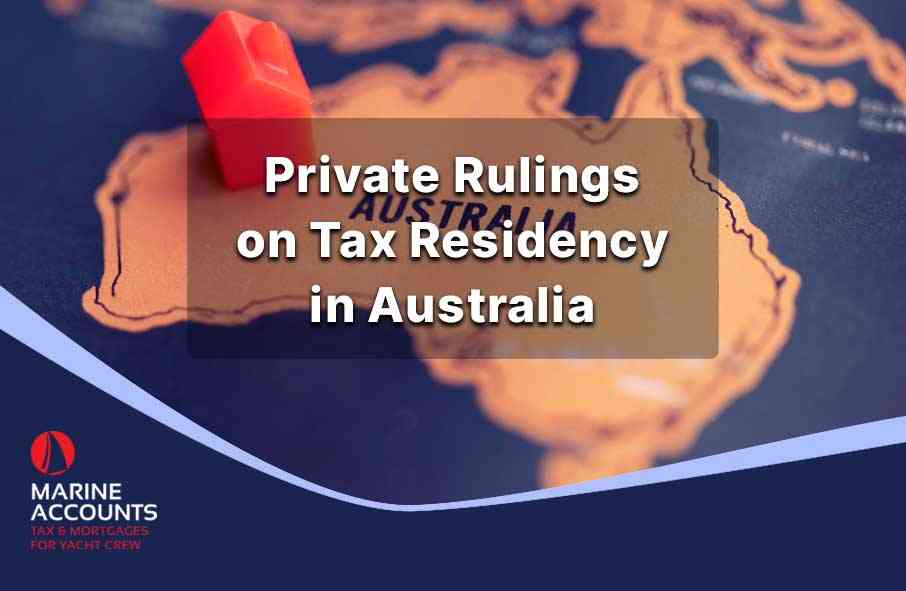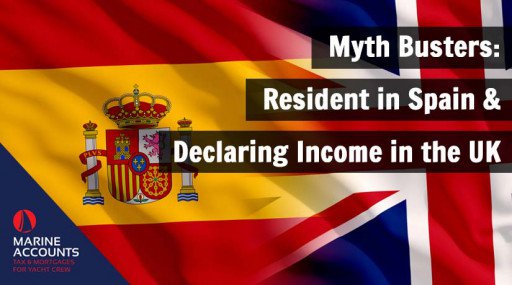Myth Busters - Private Rulings on Tax Residency in Australia
- Authors
-
-

- Name
- Patrick Maflin
-

Are you considering a career in yachting?
Then as with all overseas employment, it’s important to familiarise yourself with tax residency legislation and how it will impact you.
This blog will set out the rules as they apply to yachties and tell you why Private Rulings are not the easy solution they are often touted to be.
Confused? Don’t worry. Read on for some straightforward information and advice.
Chapters
Complicated and Outdated
The bad news is that Australian residency legislation is notoriously complicated and outdated.
In 2018 the Board of Taxation, the Australian government’s tax advisory board, carried out a review of residency rules (which had first been enacted in 1930).
The board found that the current residency rules "do not meet the objectives of simplicity, efficiency, equity and integrity" and that they require "reform as a matter of priority”.
There are four tests which determine whether an individual is an Australian resident and therefore liable to pay tax there.
These tests are residence according to ordinary concepts (or the resides test); the domicile and permanent place of abode test; the 183-day test; and the Commonwealth superannuation fund test.
An individual must only satisfy the criteria for one of these tests to be considered to be resident in Australia.
Double Taxation
The danger is that if you are found to be resident in Australia, you must of course pay taxes there.
However, if you have not established what other jurisdictions may consider a permanent residence in Australia; for example, if you are living on a yacht, then you may find yourself in an unenviable position facing a tax bill both in Australia and in your country of origin.
Several high-profile cases have exposed the archaic and unfair ways in which the Australian Tax Office (ATO) has interpreted the four tests to the detriment of international workers.
A widely publicised court case involving former aircraft engineer Glenn Harding highlighted the difficulty in determining a "permanent place of abode" in modern-day living.
Mr Harding lived and paid tax in Bahrain for more than five years in the same block of fully-furnished apartments.
But the Australian Federal Court decided that this did not qualify as a permanent place of residence and found him to be still resident in Australia.
This decision was later overturned in what was widely hailed as a victory for common sense.
The Four Tests
 Image source: Shutterstock
Image source: Shutterstock
Let’s look at the four tests and how they can be addressed to avoid being liable for Australian tax:
Ordinary Concepts – aka The Resides Rest
Several factors make up the so-called “Ordinary Concepts.”
Intention or Purpose of Presence
This looks at the person’s stated reason for being in Australia, and at their actions, to see if they match up.
For example, holding a bank account with a considerable balance and a long lease or rental property may indicate an extended stay.
Family & Business/Employment Ties
If you have family living in Australia this may indicate residency.
Alternately, having family located elsewhere may indicate non-residency.
Maintenance & Location of Assets
If you own property, vehicles or significant household effects in Australia, these may all indicate residency.
Social & Living Arrangements
If you’re a member of clubs and societies, if you have mail redirected to Australia and if there are other indicators such as enrolling children in local schools – these can all be considered as an intent of residency.
Domicile/Permanent Place of Abode Test
A domicile is a place the law considers to be your permanent home.
You can only have one domicile at a time.
Your abode is where you live with your family and sleep at night.
In this case, permanent abodes constitute any residence that is not temporary or transitory.
The relevant factors in determining a domicile/permanent place of abode are the length of stay overseas and continuity of that stay, whether there is an established home overseas, and any family and financial ties.
The Domicile/Permanent Place of Abode Test is the most common rule that yacht crew are deemed to be resident under.
The IT2650 tax ruling clearly states that individuals aboard ships, oil rigs, or mining towns, will be less likely to be considered to have established a permanent place of abode overseas.
However, there have been cases that have managed to overturn this ruling such as (Koitaki Para Rubber Estates Limited v FC of T (1941) 64 CLR 241).
183 Day Rule
This rule simply counts the number of days a person spends physically present in Australia within any fiscal year.
If a person spends over 183 days in Australia, that is, more than half a year, they may be considered a resident.
Superannuation Fund
If a person is a contributing member (or is the spouse or child under 16 of a person who is a contributing member) of the superannuation fund for Commonwealth government officers, they may be considered a resident.
Private Rulings - The Dangers for Yachties
The ATO provides individual advice on how the Australian Tax Laws apply to you in a particular circumstance.
You can send a voluntary disclosure to the ATO for a Private Ruling to gain certainty about your resident and taxation status, and they will provide a detailed decision.
This means that you won’t have to try and work out your residency status and will get information straight from the horse’s mouth.
Sounds good? Well, these private rulings are legally binding and extremely hard to contest.
They are decided by a judge, and there is no guarantee that your judge will understand your individual circumstances or yachting in general.
If the judge determines that you are a resident of Australia, they can demand that you pay tax for the whole period in question.
If you are trying to demonstrate that you are a permanent resident because you are living on a yacht, that is also hard to do because nobody has ever successfully argued that a yacht qualifies as a permanent place of abode.
Ask the Experts
If this all seems baffling and demoralising, then our advice would be to avoid going for the so-called easy option, the risky private ruling.
There are simple ways to minimise the chance of being considered a resident in Australia.
The most obvious of these is to spend less than 183 days a year in Australia and not be part of a government superannuation scheme.
It’s also advisable not to maintain bank accounts, hold club memberships or own property and personal effects in Australia to build a case for non-residency.
If you are unsure of your residency status and need clear, knowledgeable advice contact us for a consultation.
Disclaimer: Any advice in this publication is not intended or written by Marine Accounts to be used by a client or entity for the purpose of (i) avoiding penalties that may be imposed on any taxpayer or (ii) promoting, marketing or recommending to another party matters herein.






